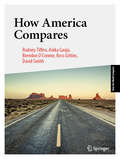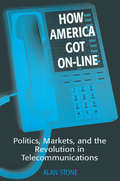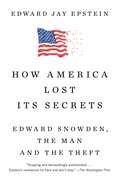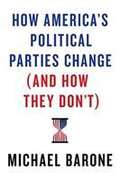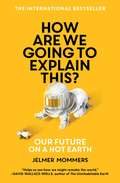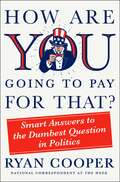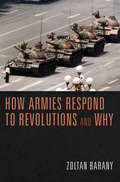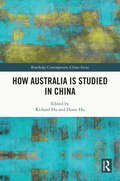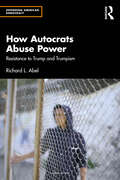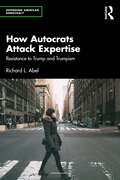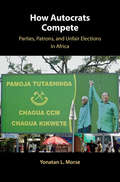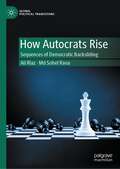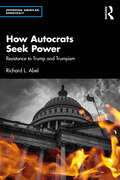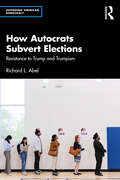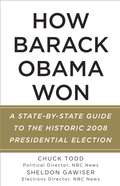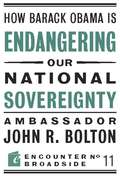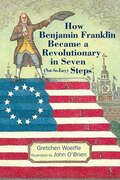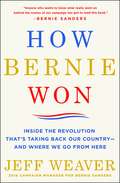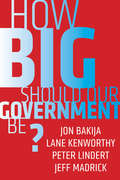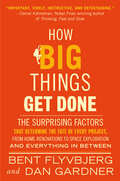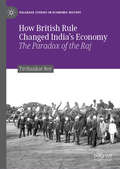- Table View
- List View
How America Compares (How the World Compares)
by Rodney Tiffen Ross Gittins David Smith Anika Gauja Brendon O'ConnorThis book is a reference work with an encyclopedic range, offering contemporary and systematic comparisons between the United States and 17 other economically advanced, stable liberal democracies, as well as some more global comparisons. It offers international data on as many aspects of social life as possible, from taxation to traffic accidents, homicide rates to health expenditure, and interest rates to internet usage. Wherever possible, it offers not only the most recent available data but also trends over decades. The discussion focuses on changes over time and comparisons between countries. Sometimes the contrasts are striking; sometimes the commonalities are more instructive. Often national political debates are conducted in a vacuum, and examining comparative data on policies, performance, and prospects can give a better perspective.
How America Got On-line: Politics, Markets, and the Revolution in Telecommunication
by Alan StoneThe telecommunications industry is the fastest growing sector of the US economy. This interdisciplinary study of technopolitical economics traces the industry's evolution from the invention of the telephone to the development of hypercommunications. Primary focus is on AT&T and its rivals.
How America Lost Its Secrets: Edward Snowden, the Man and the Theft
by Edward Jay EpsteinA groundbreaking exposé that convincingly challenges the popular image of Edward Snowden as hacker turned avenging angel, while revealing how vulnerable our national security systems have become--as exciting as any political thriller, and far more important. After details of American government surveillance were published in 2013, Edward Snowden, formerly a subcontracted IT analyst for the NSA, became the center of an international controversy: Was he a hero, traitor, whistle-blower, spy? Was his theft legitimized by the nature of the information he exposed? When is it necessary for governmental transparency to give way to subterfuge? Edward Jay Epstein brings a lifetime of journalistic and investigative acumen to bear on these and other questions, delving into both how our secrets were taken and the man who took them. He makes clear that by outsourcing parts of our security apparatus, the government has made classified information far more vulnerable; how Snowden sought employment precisely where he could most easily gain access to the most sensitive classified material; and how, though he claims to have acted to serve his country, Snowden is treated as a prized intelligence asset in Moscow, his new home.From the Hardcover edition.
How America Works: Understanding Your Government And How You Can Get Involved
by Elliott RebhunLearning about civics shouldn't be boring. How America Works gives teens a fun, behind-the-scenes look at how the U.S. government works, why they should care and how they can get involved. But this isn’t just any old civics primer. Appealing graphics and a conversational tone draw readers in from the very first page. Political cartoons and debates spark critical thought. And age-appropriate explanations make even the most complex civics topics accessible and easy to understand. In short, this comprehensive guide has everything teens need to know about government and civic engagement (and probably don’t).
How America's Political Parties Change (and How They Don't)
by Michael BaroneThe election of 2016 prompted journalists and political scientists to write obituaries for the Republican Party--or prophecies of a new dominance. But it was all rather familiar. Whenever one of our two great parties has a setback, we've heard: "This is the end of the Democratic Party," or, "The Republican Party is going out of existence." Yet both survive, and thrive. In this book, Michael Barone brings a deep understanding of our electoral history to the question and finds a compelling answer. He illuminates how both parties have adapted, swiftly or haltingly, to shifting opinion and emerging issues, to economic change and cultural currents, to demographic flux.
How Are We Going to Explain This?: Our Future on a Hot Earth
by Jelmer MommersThere&’s a new story in the making, one in which the consequences of our actions add up—and every contribution is meaningful.If climate change is the biggest threat humanity has ever faced, then why are we doing so little about it? And where do we go from here? Journalist Jelmer Mommers knows most people prefer not to talk or even think about climate change, and that is exactly why he wrote this book. Denial and despair are not the only possible responses to the current crisis. Drawing on the latest science, Mommers describes how we got here, what possible future awaits us, and how you can help make a difference. Five years in the making, How Are We Going to Explain This was an instant bestseller in the Netherlands. With this revised and updated translation, including responses to the COVID-19 pandemic, Mommers brings his unique blend of realism and hope to the wider world.
How Are You Going to Pay for That?: Smart Answers to the Dumbest Question in Politics
by Ryan CooperA compelling alternative view of the relationship between our politics and our economy.Throughout America, structural problems are getting worse. Economic inequality is near Gilded Age heights, the healthcare system is a mess, and the climate crisis continues to grow. Yet most ambitious policy proposals that might fix these calamities are dismissed as wastefully expensive by default. From the kitchen table to Congress, debates are punctuated with a familiar refrain: “How are you going to pay for that?”This question is designed to shut down policy pushes up front, minimizing any interference with the free market. It comes from neoliberalism, an economic ideology that has overtaken both parties. Proponents insist that markets are naturally-occurring and apolitical—and that too much manipulation of the economy will make our society fall apart. Ryan Cooper argues that our society already is falling apart, and the logically preposterous views of neoliberalism are to blame. Most progressives understand this instinctively, but many lack the background knowledge to make effective economic counterarguments.How Are You Going To Pay For That? is filled with engaging discussions and detailed strategies that policymakers and citizens alike can use to assail even the most entrenched lines of neoliberal logic, and start to undo these long-held misconceptions. Equal parts economic theory, history, and political polemic, this is an essential roadmap for winning the key battles to come.
How Armies Respond to Revolutions and Why
by Zoltan BaranyWe know that a revolution's success largely depends on the army's response to it. But can we predict the military's reaction to an uprising? How Armies Respond to Revolutions and Why argues that it is possible to make a highly educated guess--and in some cases even a confident prediction--about the generals' response to a domestic revolt if we know enough about the army, the state it is supposed to serve, the society in which it exists, and the external environment that affects its actions. Through concise case studies of modern uprisings in Iran, China, Eastern Europe, Burma, and the Arab world, Zoltan Barany looks at the reasons for and the logic behind the variety of choices soldiers ultimately make.Barany offers tools--in the form of questions to be asked and answered--that enable analysts to provide the most informed assessment possible regarding an army's likely response to a revolution and, ultimately, the probable fate of the revolution itself. He examines such factors as the military's internal cohesion, the regime's treatment of its armed forces, and the size, composition, and nature of the demonstrations. How Armies Respond to Revolutions and Why explains how generals decide to support or suppress domestic uprisings.
How Australia Decides
by Sally YoungIn recent years, the Australian media have come under fire for their reporting of politics and election campaigns. Political reporting is said to be too influenced by commercial concerns, too obsessed with gossip and scandal, and too focused on trivia and 'sound bites' at the expense of serious issues. There are accusations of bias, sensationalism, 'lazy' journalism and 'horse-race' reporting that is obsessed with opinion polls. How Australia Decides is the first book to put these allegations to the test. Based on a four-year empirical study, Sally Young reports the results of the only systematic, historical and in-depth analysis of Australian election reporting. This groundbreaking book shows how election reporting has changed over time, and how political news audiences, news production and shifts in political campaigning are influencing media content, Ai with profound implications for Australian democracy.
How Australia is Studied in China (ISSN)
by Richard Hu Diane HuChina has arguably the largest community of Australian studies in the world. However, not much is known about this phenomenon, including its emergence, rationale, interests, influences, and the implications for strategic Australia-China engagement in a region of increasing challenge and uncertainty. This volume unpacks how Australia is taught, learnt, researched, communicated, and promoted in the Asian giant as well as its largest trade partner. In doing so, it penetrates the representation and essence of this phenomenon to seek both the ‘Australianness’ and the ‘Chineseness’ in it.This volume collects contributions from a group of leading and emerging Chinese and Australian scholars—who are members and insiders of this community—to jointly debate on this intellectual entity and its significant influences and implications. Produced at a critical moment of commemorating half a century of China-Australia diplomatic relations and four decades of formalised Australian studies in China, this volume provides an up-to-date, comprehensive, and insightful examination of this Australia-China engagement.It will be of interest to scholars, students, policymakers, and general readers in areas of Australian studies, Chinese studies, Asia-Pacific studies, China-Australia relations, and international relations.
How Autocrats Abuse Power: Resistance to Trump and Trumpism (Defending American Democracy)
by Richard L. AbelChronicling and analyzing resistance to the threat that autocracy poses to American liberal democracy, this book provides the definitive account of both Trump’s efforts to erode democracy’s essential elements and opposition to those efforts. This book is about the threat of autocracy, which antedated Donald Trump and will persist after he leaves the stage. Autocrats blur or breach the separation of powers, use executive orders to bypass the legislature, pack the courts, replace career prosecutors with political appointees, abuse the pardon power, and claim immunity from the law. They seek to hobble opposition from civil society by curtailing speech and assembly, tolerating and even encouraging vigilante violence, and attacking the media. As this book demonstrates, Trump followed the autocrat’s playbook in many ways. He was a huckster of hate, aiming his vitriol at women and racial minorities and making attacks on immigrants the focus of his 2016 campaign, as well as his first years in office. Nevertheless, his rhetoric and policies encountered widespread opposition—from religious leaders, business executives, lawyers and bar associations, and civil servants. His executive orders (on which he relied) were almost all struck down by courts: including the first two “Muslim bans,” the detention of children and their separation from parents, the diversion of military funds to build the border wall, the insertion of a citizenship question in the census, and the limits on asylum. Just as Trump sought to weaponize the criminal justice system against his political opponents, so he manipulated it to defend his cronies, derailing some of their prosecutions. Trump also intervened in courts martial and criminal prosecutions of those convicted of war crimes in Afghanistan and Iraq and those accused of desertion and terrorism. Again, however, there was resistance, as some career prosecutors withdrew from cases or resigned when subjected to political pressure and federal courts convicted all of Trump’s allies—even though the president went on to use his unreviewable pardon power. This book, then, documents the abuses that are characteristic of autocracy and assesses the various forms of resistance to them. This definitive account and analysis of Trumpism in action, as well as the resistance to it, will appeal to scholars, students, and others with interests in politics, populism, and the rule of law and, more specifically, to those concerned with resisting the threat that autocracy poses to liberal democracy.
How Autocrats Attack Expertise: Resistance to Trump and Trumpism (Defending American Democracy)
by Richard L. AbelChronicling and analyzing resistance to the threat that autocracy poses to American liberal democracy, this book provides the definitive account of Trump’s assault on truth and his populist attacks on expertise, as well as scientific and legal opposition to them. This book is about the threat of autocracy, which antedated Donald Trump and will persist after he leaves the stage. Pandering to populists, autocrats attack professional expertise in an Orwellian world, where “ignorance is strength” and where, as Hannah Arendt wrote, people “believe everything and nothing.” Trump sought to inflame xenophobia by blaming China for the pandemic and closing U.S. borders, then declaring victory and, when that proved premature, wrongly blaming the number of tests for escalating cases. He sought to muzzle government scientists and denounced those who defied or evaded his directives as members of the “deep state,” preferring to rely on inexpert buddies. He elevated obscure scientists who promoted quack cures and opposed effective preventive measures while sidelining the few reputable experts, who nevertheless courageously resisted political interference. In addition to these, as this book documents, independent scientists, scientific journals and professional associations also outspoken, often more so. Even the pharmaceutical industry sought to preserve the integrity of a federal bureaucracy that assured the public the drugs they consumed were safe and efficacious. Following Trump’s numerous efforts to distort and undermine expertise, this book describes and evaluates the resilience of scientific and legal defenses of truth. This definitive account and analysis of the Trump’s populist rejection of truth and expertise will appeal to scholars, students and others with interests in politics, populism and the rule of law and, more specifically, to those concerned with resisting the threat that autocracy poses to liberal democracy.
How Autocrats Compete: Parties, Patrons, and Unfair Elections in Africa
by Yonatan L. MorseMost autocrats now hold unfair elections, yet how they compete in them and manipulate them differs greatly. How Autocrats Compete advances a theory that explains variation in electoral authoritarian competition. Using case studies of Tanzania, Cameroon, and Kenya, along with broader comparisons from Africa, it finds that the kind of relationships autocrats foster with supporters and external actors matters greatly during elections. When autocrats can depend on credible ruling parties that provide elites with a level playing field and commit to wider constituencies, they are more certain in their own support and can compete in elections with less manipulation. Shelter from international pressure further helps autocrats deploy a wider range of coercive tools when necessary. Combining in-depth field research, within-case statistics, and cross-regional comparisons, Morse fills a gap in the literature by focusing on important variation in authoritarian institution building and international patronage. Understanding how autocrats compete sheds light on the comparative resilience and durability of modern authoritarianism.
How Autocrats Rise: Sequences of Democratic Backsliding (Global Political Transitions)
by Ali Riaz Md Sohel RanaFor the past decade and a half, the world has witnessed a precipitous decline of democratic countries and the consequent rise of autocrats. How Autocrats Rise: Sequences of Democratic Backsliding challenges the conventional wisdom and offers an institutional-ideological approach to understand the phenomenon, examines the steps of emergent autocrats, and analyzes the methods of legitimizing their rules. Employing the new framework, the book provides incisive analyses of four countries located in four different regions with dissimilar national features – Bangladesh, Bolivia, Hungary, and Turkey, and demonstrates that political developments in these countries have followed a similar, specific pattern resulting in various shades of autocracy. Theoretically enriched and empirically grounded, this exceptionally timely book makes significant contribution to the democratic backsliding literature while offering insights on how to forestall an autocratic era.
How Autocrats Seek Power: Resistance to Trump and Trumpism (Defending American Democracy)
by Richard L. AbelChronicling and analyzing resistance to the threat that autocracy poses to American liberal democracy, this book provides the definitive account of the rise of Trump’s populist support in 2016, and his failed efforts to nullify the result of the 2020 election.This book is about the threat of autocracy, which antedated Donald Trump and will persist after he leaves the stage. Autocracy negates both liberalism—which includes the protection of fundamental rights, the rule of law, separation of powers, and respect for specialist expertise—and democracy—which requires that the state be responsible to an electorate composed of all eligible voters—by concentrating unconstrained power in a single individual. Anticipating defeat in the 2016 election, Trump attacked suggestions that he had sought, or even benefited from, Russian assistance despite the evidence, and he made repeated claims of election fraud. In 2020, fearful that his mishandling of the pandemic had alienated voters, he intensified the allegations of fraud, demanding recounts, pressuring state legislatures and state election officials, advancing bizarre conspiracy theories, and finally, calling for a massive demonstration, urging protesters to march to the Capitol to pressure Congress, promising to accompany them. But as this book documents, Trump’s efforts to nullify the result of the 2020 election failed. As the courts rejected his numerous challenges, state election officials loyally performed their statutory duties, the Justice Department found no evidence of fraud, and politicians from all sides certified Biden’s victory, this book traces the many, and varied, forms of the defense of liberal democracy located within both the state and civil society, including law (judges, government lawyers, and private practitioners), the media, NGOs, science (and other forms of expertise), and civil servants (in federal, state, and local government). Evaluating their efficacy, the book maintains, is vital if—as history has repeatedly taught us—the price of liberal democracy, like that of liberty itself, is eternal vigilance.This definitive account and analysis of Trumpism and the resistance to it will appeal to scholars, students, and others with interests in politics, populism, and the rule of law and, more specifically, to those concerned with resisting the threat that autocracy poses to liberal democracy.
How Autocrats Subvert Elections: Resistance to Trump and Trumpism (Defending American Democracy)
by Richard L. AbelChronicling and analyzing resistance to the threat that autocracy poses to American liberal democracy, this book provides the definitive account of the response to the January 6, 2021, assault on the Capitol and Republican efforts to overturn the 2020 election and bias future elections in their favor.In December 2020, Donald Trump invited supporters to DC for what he promised would be a “wild” demonstration against Biden’s victory. On January 6, 2021, he directed the mob he had summoned to march on the Capitol, where it ransacked the building, caused five deaths and hundreds of injuries, and delayed but failed to prevent certification of the election. Although some Congressional Republicans briefly distanced themselves from Trump, the party quickly closed ranks around him. The business community, similarly, initially expressed criticism but soon resumed campaign contributions to Republicans. Democrats sought to impeach Trump (for the second time), but Republicans blocked conviction. Democrats created a House Select Committee, which exposed Trump’s complicity through dramatic televised hearings and a comprehensive report. Republicans responded by denying there had been a riot—one calling it a mere tourist visit—and sanctifying those arrested. Nevertheless, all but two of the nearly 1,400 charged were convicted. Judges appointed by both Democratic and Republican presidents harshly condemned the insurrectionists, imposing sentences that did not vary by the judge’s party preference. This book contextualizes these continuing threats to American democracy through an opening chapter exposing distressing parallels with the rise of Nazism in 1930s Germany. The penultimate chapter examines the ways in which Republicans persisted in seeking to overturn the 2020 election and distort subsequent elections by gerrymandering and creating obstructions to potential Democratic voters. All the chapters focus on the multiple forms of resistance—politics, social action, economic pressure, media exposure, and criminal prosecution—evaluating their relative efficacy and comparing them with modes of resistance analyzed in the author’s related volumes.This definitive account and analysis of Trump’s and his supporters’ attempts to subvert the 2020 election will appeal to scholars, students, and others with interests in politics, populism, and the rule of law, and more specifically, to those concerned with resisting the threat that autocracy poses to liberal democracy.
How Barack Obama Won: A State-by-State Guide to the Historic 2008 Presidential Election
by Chuck Todd Sheldon GawiserThis detailed overview and analysis of the results of Barack Obama's historic 2008 presidential win gives us the inside state-by-state guide to how Obama achieved his victory, and allows us to see where the country stood four years ago. Although much has changed in the nearly four years since, How Barack Obama Won remains the essential guide to Obama's electoral strengths and offers important perspective on his 2012 bid. The votes in each state for Obama and McCain are broken down by percentage according to gender, age, race, party, religious affiliation, education, household income, size of city, and according to views about the most important issues (the economy, terrorism, Iraq, energy, healthcare), the future of the economy (worried, not worried) and the war in Iraq (approve, disapprove).
How Barack Obama is Bankrupting the U.S. Economy
by Stephen MooreIn his first nine months in office Barack Obama has pursued the most aggressive government expansionist agenda since Franklin Roosevelt's new deal was launched in 1933. White House chief of staff Rahm Emanuel summarized the Obama first-year game plan best: "An economic crisis is a terrible thing to waste." So far, we have seen multi-trillion dollar bailouts in housing, banking, insurance, and auto industries, the stimulus plan, cap and trade, a $1.2 trillion health care bill, and of course, the $4 billion cash for clunkers program. None of this has worked. Now, six months after the stimulus progam, we sit at 9.4% unemployment. Two million more Americans are jobless. The debt has exploded like a cork from a bottle of champagne. We are now told that the Obama agenda will cost $9 trillion in debt as it plans to spend $42 trillion over the next decade.In this riveting broadside, Stephen Moore explains this rotten story of Washington arrogance and malfeasance, and reveals exactly why Obamanomics failed.
How Barack Obama is Endangering our National Sovereignty
by John R BoltonToday, American sovereignty is more challenged than ever before, not from enemies that threaten us militarily but from "friends" who urge us to share or reduce our sovereignty for larger global objectives. How Barack Obama is Endangering our National Sovereignty reveals what sovereignty means to Americans, not as an abstraction but as a vibrant component of self government.Former Ambassador to the U.N. John R. Bolton looks at specific threats to U.S. sovereignty, from "global governance" to the White House, and recommends what Americans can do to defend their sovereignty and resist encroachments from the wide array of challenges we face, internationally and in our own domestic politics.
How Benjamin Franklin Became a Revolutionary in Seven (Not-So-Easy) Steps
by Gretchen WoelfleHow did Ben Franklin become an outspoken leader of the American Revolution? Learn all about it in seven (not-so-easy) steps in this humorous, accessible middle-grade chapter book that focuses on Ben&’s political awakening.Famous founding father Benjamin Franklin was a proud subject of the British Empire—until he wasn&’t. It took nearly seventy years and seven not-so-easy steps to turn Benjamin Franklin from a loyal British subject to a British traitor—and a fired-up American revolutionary. In this light, whimsical narrative, young readers learn how Franklin came to be a rebel, beginning with his childhood lesson in street smarts when he buys a whistle at an inflated price. Franklin is a defiant boy who runs away from his apprenticeship, and while he becomes a deep thinker, a brilliant scientist, and a persuasive writer when he grows up, he never loses that spark. As a community leader who tries his best to promote peace and unity both between the colonies and with Great Britain, he becomes more and more convinced that independence for the American colonies is the way forward.Illustrated throughout with art by noted New Yorker cartoonist and illustrator John O&’Brien and sprinkled with quotations from Franklin, this unfamiliar story of a familiar figure in American history will surprise and delight young readers.
How Bernie Won: Inside the Revolution That's Taking Back Our Country--and Where We Go from Here
by Jeff WeaverThe brilliant manager of Bernie Sanders’s 2016 presidential campaign shows how Bernie took on the entire establishment and changed modern American politics for good.When Jeff Weaver hopped in a car with Bernie Sanders in the summer of 1986, he had no idea the Vermont backroads would lead them all the way to the 2016 presidential campaign. In How Bernie Won, Weaver shows how Bernie sparked a movement that would sweep America and inspire millions. He vowed not to run a negative campaign. He would focus on policies, not personalities. He would not be beholden to big money. He would actually make America work for ordinary people. Weaver also shows how they overcame significant challenges: A media that thrived on negative campaigns. A party controlled by insiders. And a political system dependent on big money. Weaver explains how Bernie beat them all and, in doing so, went from having little national name recognition when he entered to the race to being one of the most respected and well-known people in the world by its end—because, Weaver argues, Bernie won the race. He moved the discussion from the concerns of the 1% to those of the 99%. He forced the Democrats to remember their populist roots. And he showed that an outsider with real ideas and ways to get them done could compete and win against the establishment’s hand-picked candidate. From holding bags of “Bernie buttons” and picket-stick signs, to managing thousands of campaign workers, to looking ahead to 2020, Weaver chronicles the birth of a revolution that didn’t end in November 2016. It’s only just begun.
How Big Should Our Government Be?
by Jeff Madrick Jon Bakija Lane Kenworthy Peter LindertThe size of government is arguably the most controversial discussion in United States politics, and this issue won't fade from prominence any time soon. There must surely be a tipping point beyond which more government taxing and spending harms the economy, but where is that point? In this accessible book, best-selling authors Jeff Madrick, Jon Bakija, Lane Kenworthy, and Peter Lindert try to answer whether our government can grow any larger and examine how we can optimize growth and fair distribution.
How Big Things Get Done: The Surprising Factors That Determine the Fate of Every Project, from Home Renovations to Space Exploration and Everything In Between
by Bent Flyvbjerg Dan Gardner&“Why do big projects go wrong so often, and are there any lessons you can use when renovating your kitchen? Bent Flyvbjerg is the &‘megaproject&’ expert and Dan Gardner brings the storytelling skills to How Big Things Get Done, with examples ranging from a Jimi Hendrix studio to the Sydney Opera House.&”—Financial Times &“Entertaining . . . There are lessons here for managers of all stripes.&”—The EconomistA BEST BOOK OF THE YEAR: Economist, Financial Times, CEO Magazine, MorningstarFinalist for the Porchlight Business Book Award, the Financial Times and Schroders Business Book of the Year Award, and the Inc. Non-Obvious Book AwardNothing is more inspiring than a big vision that becomes a triumphant, new reality. Think of how the Empire State Building went from a sketch to the jewel of New York&’s skyline in twenty-one months, or how Apple&’s iPod went from a project with a single employee to a product launch in eleven months.These are wonderful stories. But most of the time big visions turn into nightmares. Remember Boston&’s &“Big Dig&”? Almost every sizeable city in the world has such a fiasco in its backyard. In fact, no less than 92% of megaprojects come in over budget or over schedule, or both. The cost of California&’s high-speed rail project soared from $33 billion to $100 billon—and won&’t even go where promised. More modest endeavors, whether launching a small business, organizing a conference, or just finishing a work project on time, also commonly fail. Why?Understanding what distinguishes the triumphs from the failures has been the life&’s work of Oxford professor Bent Flyvbjerg, dubbed &“the world&’s leading megaproject expert.&” In How Big Things Get Done, he identifies the errors in judgment and decision-making that lead projects, both big and small, to fail, and the research-based principles that will make you succeed with yours. For example:• Understand your odds. If you don&’t know them, you won&’t win.• Plan slow, act fast. Getting to the action quick feels right. But it&’s wrong. • Think right to left. Start with your goal, then identify the steps to get there.• Find your Lego. Big is best built from small.• Be a team maker. You won&’t succeed without an &“us.&”• Master the unknown unknowns. Most think they can&’t, so they fail. Flyvbjerg shows how you can.• Know that your biggest risk is you.Full of vivid examples ranging from the building of the Sydney Opera House, to the making of the latest Pixar blockbusters, to a home renovation in Brooklyn gone awry, How Big Things Get Done reveals how to get any ambitious project done—on time and on budget.
How Border Peripheries are Changing the Nature of Arab States
by Maha YahyaThis book addresses the multiple dimensions of the limited reach, or breakdown, of central authority in border regions of Arab states, and their implications for state sovereignty and modes of governance. These include the emergence of illicit networks of exchange, the rise of new nonstate actors in border regions, including paramilitary or jihadi groups, and the transformation of border areas into areas of regional conflict. Collectively, the essays in this volume address such processes, which have been observable in conflict-stricken countries such as Syria, Iraq, and Yemen, and in fragile political or economic contexts, like the ones in Lebanon, Tunisia, and Algeria, as well as in relatively stable Emirates such as Kuwait. The contributions also shed light on how border peripheries in the Arab world have impacted the center of political and economic power in their states.
How British Rule Changed India’s Economy: The Paradox of the Raj (Palgrave Studies in Economic History)
by Tirthankar RoyThis Palgrave Pivot revisits the topic of how British colonialism moulded work and life in India and what kind of legacy it left behind. Did British rule lead to India’s impoverishment, economic disruption and famine? Under British rule, evidence suggests there were beneficial improvements, with an eventual rise in life expectancy and an increase in wealth for some sectors of the population and economy, notably for much business and industry. Yet many poor people suffered badly, with agricultural stagnation and an underfunded government who were too small to effect general improvements. In this book Roy explains the paradoxical combination of wealth and poverty, looking at both sides of nineteenth century capitalism. Between 1850 and 1930, India was engaged in a globalization process not unlike the one it has seen since the 1990s. The difference between these two times is that much of the region was under British colonial rule during the first episode, while it was an independent nation state during the second. Roy's narrative has a contemporary relevance for emerging economies, where again globalization has unleashed extraordinary levels of capitalistic energy while leaving many livelihoods poor, stagnant, and discontented.
